Far Ings National Nature Reserve
Far Ings national nature reserve is an area of over 64 ha (160 acres) on the southern shore of the Humber Estuary in North Lincolnshire, England. It is immediately west of the town of Barton-upon-Humber and the village of Barton Waterside. In addition to be designated as a national nature reserve, it is within the Humber Estuary Ramsar site, Site of Special Scientific Interest, Special Area of Conservation, and Special Protection Area.[2]
| Far Ings | |
|---|---|
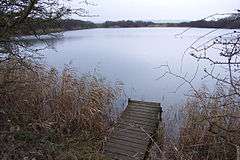 | |
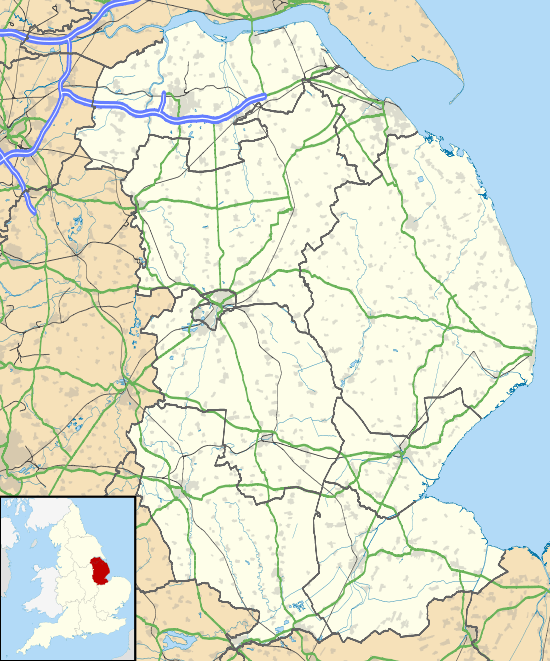 | |
| OS grid | TA017233 |
| Coordinates | 53.696838°N 0.45998523°W |
| Area | 59 hectares (150 acres) |
| Managed by | Lincolnshire Wildlife Trust |
| Designated | 28 July 1994 |
| Reference no. | 663[1] |
History
The clay pits on the Humber foreshore were the focus of a tile and cement industry from 1850 to 1959.[3] The industrial sites were abandoned in the early 20th century once supplies of clay began to run out. The clay workings filled with water and became colonised by species of reeds. The reserve was acquired by Lincolnshire Wildlife Trust in 1983, who opened it in the same year.[4]
The site was designed as a national nature reserve in April 2005.[5]
A tidal surge on 5 December 2013 caused by Cyclone Xaver breached the flood defences on the Humber bank, flooding the reserve. The visitor centre re-opened in August 2014.[6]
The visitor centre, toilets, and car park were closed during the COVID-19 Pandemic in England.[7]
_-_geograph.org.uk_-_1028660.jpg) The visitor centre in 2008
The visitor centre in 2008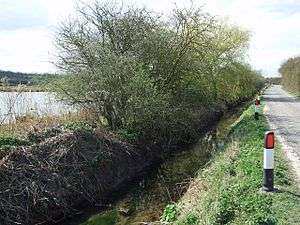 Far Ings road
Far Ings road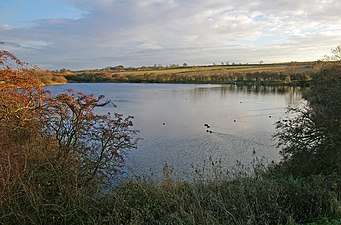
Species
There are more than 250 species of moths, 230 species of wildflower, and at least 19 species of butterflies identified from Far Ings.[8] The first Eurasian bitterns to breed in Lincolnshire in over 30 years were seen at Far Ings in 2000.[9] A Blyth's reed warbler was spotted at the reserve in June 2020.[10]
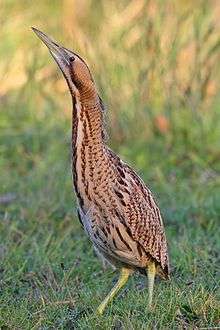 Eurasian Bittern at Far Ings, 2013
Eurasian Bittern at Far Ings, 2013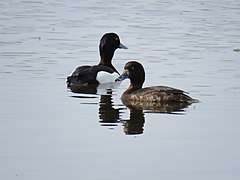 Tufted ducks
Tufted ducks.jpg) Bombus lapidarius
Bombus lapidarius.jpg) Drinker moth larva
Drinker moth larva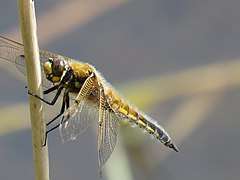 Dragonfly
Dragonfly
References
- "Humber Estuary". Ramsar Sites Information Service. Retrieved 1 February 2020.
- "Far Ings NNR". Natural England Designated Sites. Retrieved 1 February 2020.
- "Far Ings". Lincolnshire Wildlife Trust. Retrieved 1 February 2020.
- "A brief history of Far Ings". Lincolnshire Wildlife Trust. Archived from the original on 26 August 2014. Retrieved 1 February 2020.
- Lincolnshire Biodiversity Action Plan, Annual Report 2005 (PDF) (Report). Greater Lincolnshire Nature Partnership. 2006. Retrieved 1 February 2020.
- "Far Ings reserves's visitor centre reopens after storm". BBC News. 16 August 2014.
- "Coronovirus (COVID-19), Lincolnshire Wildlife Trust statement - updated 10 June 2020". Lincolnshire Wildlife Trust. 10 June 2020. Retrieved 30 June 2020.
- "Far Ings Nature Reserve". In Barton. Retrieved 1 February 2020.
- "Booming bittern pays a flying visit". BBC Lincolnshire. Retrieved 1 February 2020.
- "Review of the Week: 17-23 June 2020". Bird Guides. Retrieved 30 June 2020.